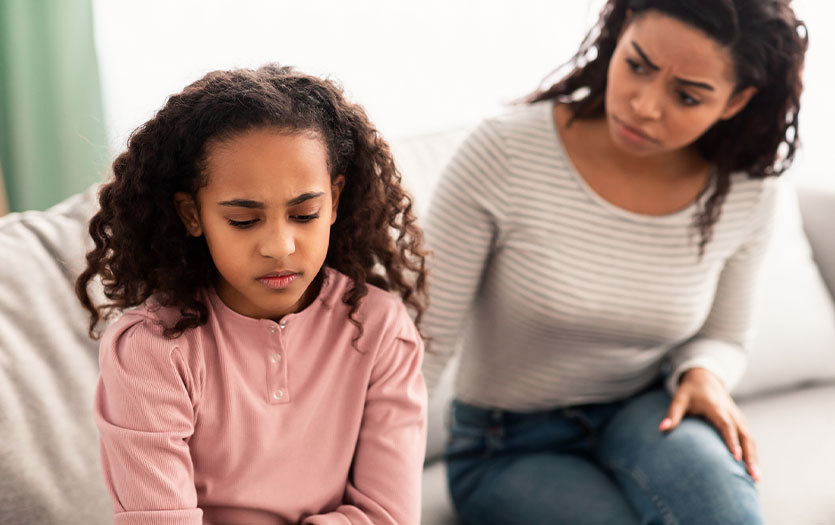
This post was written by Rafael Nunez Alvarado, MD, PPG – Pediatrics and PPG – Primary Care.
Anger is a very natural feeling for children to have. Kids of all ages can become angry in response to a certain trigger. Although it is a developmentally appropriate response in most situations, knowing why kids get angry, when you should be concerned about their behavior and how you can help them address their anger in a healthy way is important to equipping them with the tools to manage their emotions appropriately.
How does a child’s ability to communicate come into play in regard to anger?
It’s important to understand that children are emotionally immature. They have a lack of self-control and sometimes use anger as a way to express their feelings. Infants and toddlers are unable to use “big words” or even simple words to tell you how they feel, need or want—causing them to be frustrated and experience episodes of anger, which can manifest as crying, throwing things, hitting or biting.
How does anger change as kids get older?
Children of every age experience anger. However, the triggers of what cause anger as well as the way your child expresses their anger will change depending on what developmental stage they are in.
- Infants: Babies cry when they are hungry, cold, uncomfortable, overstimulated, in pain or irritable. Babies express their anger through excessive crying and fussiness, being hard to console, and actively moving their arms and legs.
- Toddlers: Because toddlers lack self-control and are unable to use words to express their feelings, their episodes of anger are based on frustration. They are starting to move and explore their environment, but quickly become frustrated with the rules and expectations they have to follow. Often, a toddler will show their frustration by throwing a tantrum, hurting themselves or others, throwing things, biting, pushing, kicking, screaming, etc.
- Older kids: At this stage, kids typically show anger or aggressive behavior as a response to their environment, such as family dynamics, abuse, neglect, discipline, stress from school, bullying, parental expectations or physical punishment. They are also learning to be more independent and are prone to bending rules and pushing limits. They direct their anger at their parents, siblings, classmates and teachers by crying, screaming, damaging property or becoming physical.
- Children with mental health conditions or developmental problems: These children also present episodes of anger and aggression, secondary to their developmental delay, social/emotional immaturity and lack of self-control. This includes kids with ADHD, autism, OCD, conduct disorder, oppositional defiant disorder, PTSD, intermittent explosive disorder and more. Anger can be expressed by screaming, hitting, biting, throwing things and causing harm to others or themselves.
What types of behavior should parents be concerned about?
In most situations, anger is a natural way for children to express themselves. However, there are certain things you should look out for that may indicate a larger problem. This includes anger and behavioral issues that persist for a long time, disrupt their home or school life, include physical aggression or destruction of property, change suddenly (especially in teenagers), or are accompanied by clear signs of depression, anxiety or thoughts of self-harm.
If you have any concerns for their safety, your safety or the safety of other people, it is important to seek help right away.
What are some healthy ways you can address your child’s anger?
Being mindful of your response as the parent, is so important for helping your child navigate their emotions. Here are some suggestions for getting through moments of anger with your child:
- Learn to identify triggers – What causes your child to become angry? What is the usual target of this anger? Learning to identify these situations can give you the opportunity to avoid episodes of anger or help your child calm down faster and in a healthy way.
- Control your emotions – The way you respond to your child’s behavior is very important. If you respond in a kind and loving way, your child will learn to control their emotions in the same way. A child that feels loved and respected is more likely to respond in a positive way than a child that feels humiliated and embarrassed.
- Be clear and consistent with discipline – Showing your child that there are consistent consequences for certain unacceptable behaviors will teach them to recognize these situations so they can stop them from happening and avoid having to be disciplined.
- Teach the rules – It may seem obvious to you, but kids don’t always understand the rules they need to follow and why. Help them by explaining the reason behind rules and why they’re important for everyone’s well-being.
- Explain their feelings – It’s hard to control your anger or other emotions when you don’t fully understand what you’re feeling. Teach your child about the different emotions they may experience and which ones are appropriate and inappropriate.
- Take a time out – Using time out can give your child an opportunity to calm down. It should not be used as a punishment, but rather a way for them to cool off in a neutral space away from distractions and any triggers. Time out length recommendation is usually one minute for each year of age (ex., a five-year-old would have a 5-minute time out). Once they’ve cooled off, this is a good opportunity to discuss with your child why the behavior was inappropriate.
- Take a time in – With this concept, instead of separating your child, you help them clam down by providing positive attention and actively assisting them in stopping the problematic behavior.
- Utilize positive reinforcement – Always reward good behavior. Praise your child when they are able to control their emotions and respond in an acceptable way. Tell them when they are doing well and how happy you are with this behavior. They will love the praise and will be likely to repeat the good behavior in the future.
- Be a role model – Children imitate the behavior they see. That’s why it’s important to be an example for your child on how they should act in frustrating or stressful situations. You can also analyze your family dynamics and encourage other family members to respond in positive ways as well.
- Avoid physical punishment – Physical punishment is rarely effective and will not teach your child to respond in a positive way. By utilizing physical punishment, you’re showing your child that it is an appropriate response, and they will be more likely to physically harm people or property when they are feeling angry.
If you have any concerns about your child’s behavior or anger, ask your pediatrician for a referral to a mental health provider.
Need a pediatrician? Dr. Nunez is now seeing patients from newborn to age 18 at the new Parkview clinic in Peru, located at 750 N. Broadway. To schedule an appointment, call 260-563-7421.



